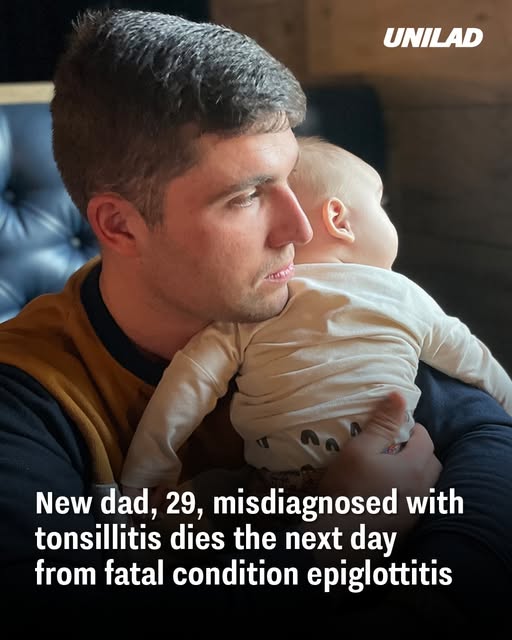In a heartbreaking twist, 29-year-old Michael Reynolds a new father and truck driver from Boston, Lincolnshire died on December 1, 2023, just one day after being misdiagnosed with tonsillitis. Michael had initially sought help on November 29 for a persistent cough and sore, swollen throat. He was prescribed a steroid nasal spray and referred for a chest X-ray. When he returned the next day with worsened symptoms including inability to swallow, throat closing up, and spitting saliva into a bowl he was again diagnosed with tonsillitis and given oral antibiotics, despite asking if he should go to the emergency room. He was not directed to seek urgent care. The following morning, he suffered a seizure, was rushed to a hospital, but tragically passed away.
Underlying Cause: Epiglottitis Leading to Hypoxic Cardiac Arrest
A coroner’s inquest revealed the real culprit was epiglottitis—a rare but dangerous swelling of the epiglottis, which can rapidly block the airway. The resulting upper airway obstruction led to hypoxic cardiac arrest (where the heart stops due to lack of oxygen), causing his death. The inquest cited a “missed opportunity” to send Michael to A&E, where staff familiar with epiglottitis might have intervened in time.

Devastated Family and Legal Action
Michael’s widow, Charlotte Reynolds, now faces life as a single parent to their son Jacob, now age three, grappling daily with his death. She said:
“Watching Jacob grow up without his daddy by his side is devastating and we miss Michael every single day.”
She holds onto memories and now uses them to explain to Jacob one day why his father is gone.
The family has instructed medical negligence lawyers from Irwin Mitchell to investigate. The coroner validated their concerns about the care Michael received. Charlotte hopes their story will raise awareness of epiglottitis and prevent future misdiagnoses.
Epiglottitis: Uncommon, Deadly, Easily Overlooked
Epiglottitis is rare in adults but potentially fatal if left untreated. Symptoms can mimic more common ailments like tonsillitis, yet key warning signs—such as drooling, severe throat pain, inability to swallow, and airway congestion—require immediate emergency intervention. Awareness of these differences is critical for timely treatment and potentially life-saving care.
Lessons for Medical Practice and Patients Alike
This tragic case underscores the need for medical staff to:
- Recognize and act upon red-flag symptoms that suggest serious conditions like epiglottitis.
- Give clear, explicit advice for emergency care when symptoms escalate or remain alarming.
- Acknowledge that rare conditions, though less likely, can present in patients of any age—especially when warning signs appear.
- From the patient side, if symptoms rapidly worsen or one feels unsatisfied with a diagnosis—especially when basic functions like swallowing are impacted—it may be wise to insist on emergency care or second opinions.

A Call to Remember—And to Change
Michael Reynolds’s death—and the absence left in his family—highlights the importance of both clinical vigilance and patient advocacy. Charlotte Reynolds’s courage in sharing their tragedy could help ensure that others might receive the timely treatment Michael lacked—and that no family endures such needless loss again.

















